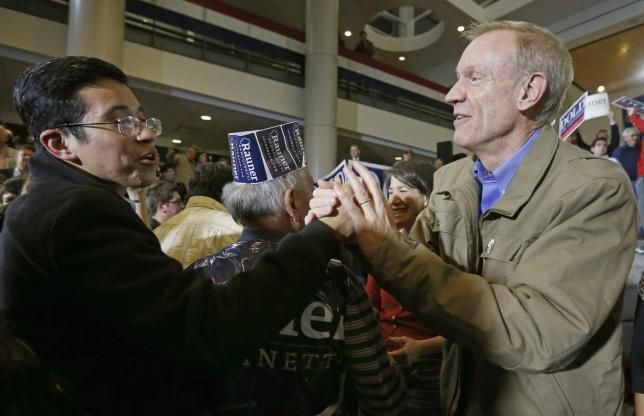Illinois Gov. Bruce Rauner Accuses Unions Of Manipulating Elections

CHICAGO -- Illinois Gov. Bruce Rauner Saturday accused lawmakers who accept campaign contributions from public employee unions of engaging in a “conflict of interest,” railing against the influence of organized labor in determining state workers’ salaries and benefits. But Rauner dismissed questions about his own potential conflicts of interest: his acceptance of campaign contributions from executives at financial firms that manage state pension money.
“They are just taxpayers. They don’t do business [with the state],” Rauner told International Business Times.
In November, International Business Times reported Rauner accepted more than $140,000 worth of campaign contributions from executives at firms contracted to invest Illinois pension money. He has also accepted millions more from executives at other financial firms, which face state regulation and oversight.
The governor appoints members of the boards that oversee the state’s pension investments. Securities and Exchange Commission records show Rauner is still listed as holding a partnership stake in the financial firm GTCR. As governor, Rauner will now oversees two state retirement systems that have GTCR listed as managing Illinois pension money, state documents show.
In his speech at the Society of American Business Editors and Writers, Rauner cited a $6 billion budget deficit and $111 billion pension shortfall to label Illinois “the worst run state in America.” A former private equity executive who made his fortune, in part, from fees charged to institutional investors like public employee pension systems, Rauner specifically took aim squarely at teachers, firefighters, police officers and other public workers. He said: “The groups that make their money from government in Illinois have a lot of money, they have the taxpayers' money and they are using it against the taxpayers’ interest.”
He added: “When a government union leader can sit across the table from an elected official and say we will get you back into office. ... We will get you there give you X millions of dollars of our union dues to pay for your campaign and 5,000 of our members to work for your election, we will answer the phones and knock on doors for you, we will get you in office, and then after you get in the office, we will negotiate what our pension is going to be, what our work rules are going to be, what our healthcare is going to be -- it is a fundamental conflict of interest.”
Rauner also commented on proposals to raise taxes to fill Illinois’ budget shortfalls. He told the crowd some people have said to him: “Just put in a graduated income tax, just get wealthier people to pay more, get them to pay their fair share, and that will solve the problem. We will have the money and we will fix it. And I say no we won’t. That will not fix the problem.” The Huffington Post reported Rauner could reap a personal windfall from the expiration of an tax surcharge on income above $750,000.
Rauner declined to take any questions from reporters at the event, and his government staff members attempted to shield him from questions as he left the conference room, drawing jeers from assembled journalists at the conference. As he was exiting the room, IBTimes asked Rauner if it is a similar conflict of interest for him to have taken money from firms that either are regulated by or do business with the state. He said only it is not the same, but did not explain further.
In 2014, Rauner’s campaign raked in $67 million, including nearly $13.5 million from Citadel’s Ken Griffin, whose Chicago-based financial firm is overseen, in part, by state securities regulators. Rauner’s opponent, then-incumbent Pat Quinn, raised $30 million, with more than $6 million coming from public employee unions.
© Copyright IBTimes 2025. All rights reserved.






















